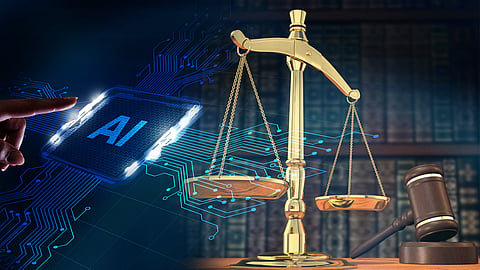
- News
- Columns
- Interviews
- Law Firms
- Apprentice Lawyer
- Legal Jobs
- हिंदी
- ಕನ್ನಡ

The Punjab and Haryana High Court on Monday disposed of a petition moved by a law student challenging OP Jindal Global University's decision to declare his submission in an exam as AI-generated and consequently fail him in a subject. [Kaustubh Anil Shakkarwar v. Jindal Global Law School, OP Jindal Global University & Anr]
Justice Jasgurpeet Singh Puri made the decision to dispose of the matter after being informed that the University had issued a revised transcript passing the student in the concerned subject.
The judge declined to consider the other prayers in the petition pertaining to copyright issues in AI-generated work, as it would be a mere academic exercise at this point.
The law student who moved the petition, Kaustubh Shakkarwar, is a lawyer who is currently pursuing Masters of Law (LL.M.) in Intellectual Property and Technology Laws at the Jindal Global Law School (JGLS). Shakkarwar has previously worked as a law researcher with the Chief Justice of India and runs an AI platform related to litigation. He also practices in the field of Intellectual Property law.
The contentious exam submission was an answer in the end of term examination for the subject ‘Law and Justice in the Globalizing World’ which is part of the LL.M. course. The Unfair Means Committee of JGLS later accused him of submitting “88% AI-generated” answers and on June 25 declared him ‘fail’ in the subject. The Controller of Examinations later upheld the decision.
This prompted Shakkarwar to move the High Court, contending that there is no explicit prohibition in the University rules against AI-generated content.
“The university is silent to state that use of AI would amount to ‘plagiarism’ and thus, the petitioner cannot be prosecuted for what is not explicitly prohibited,” the plea moved said.
However, the petition also stated that the submission was Shakkarwar's own original creation and not created with the help of any AI. The University has not presented even an “iota of evidence” to substantiate the allegation, the plea added.
Hence, he sought a declaration that no copyright subsists with an AI and that a human using AI is the author of the generated work.
In this regard, it was argued that AI is only a tool and a means to an end and in order to establish plagiarism, the violation of copyright has to be established first.
“Section 2(d)(vi) of the Copyright Act, 1957, makes it amply clear that, arguendo, if the Petitioner did even use AI, the copyright of the artistic work would lie with the petitioner, and thus the allegation of violation of copyright, fails,” Shakkarwar argued.
Shakkarwar was represented by Senior Advocate Romy Chacko and Advocates Prabhneer Swani and Ashwin Romy.
OP Jindal Global University was represented by Senior Advocate Chetan Mittal and Advocates Ajay Bhargav and Himanshu Gupta.